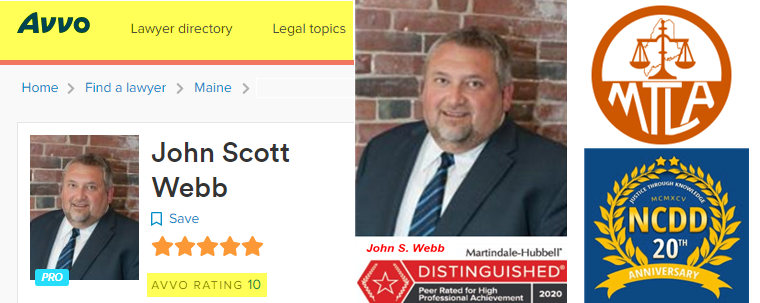Criminal mischief in Maine is a property crime involving intentional, knowing, or reckless damage to another person’s property.

Title 17-A, §806 of the Maine Revised Statutes defines criminal mischief in Maine. A person commits criminal mischief if they:
- Damage or destroy another’s property without reasonable grounds to believe they have the right to do so
- Damage property to enable insurance fraud
- Tamper with another’s property, impairing its use
- Damage property of law enforcement, fire departments, or utility providers, risking service interruption
- Place hard objects in trees or logs to damage processing equipment
Maine classifies criminal mischief as a Class D crime. In Maine, a class C criminal mischief becomes a felony if the property damage is over $2,000.
John Webb is a top-rated criminal defense attorney in Maine. He has a lot of experience with criminal mischief cases and other property crimes.
Defending Against Criminal Mischief Charges
As an experienced Maine criminal defense lawyer, John Webb understands these nuances of the criminal mischief laws in Maine:
State of Mind: Prosecutors must prove the defendant acted intentionally, knowingly, or recklessly. This can be challenging to establish, providing opportunities for defense.
Property Rights: The law states that the defendant must not have had good reasons to think they could damage the property.
Impaired Use: For tampering charges, prosecutors must show that the defendant’s actions impaired the use of the property.
Is Tenant Damage Criminal Mischief in Maine?
- Under certain circumstances, tenants can potentially commit criminal mischief in Maine through damage. Criminal mischief in Maine means intentionally, knowingly, or recklessly damaging someone else’s property.
- You must do this without a good reason to believe you have the right to do it. For tenant damage to count as criminal mischief, the damage must be intentional, knowing, or reckless. It cannot be accidental or just normal wear and tear.
- The tenant must have no reasonable grounds to believe they had the right to cause the damage.
Tenants are generally liable for intentional or accidental damage they cause during their tenancy, beyond normal wear and tear. However, not all tenant damage automatically qualifies as criminal mischief. The key factors are:
- Intent: Was the damage deliberate or due to gross negligence?
- Extent: Is the property damage significant, beyond normal wear and tear?
- Circumstances: Did the tenant reasonably believe they had permission to cause the damage?
If a tenant intentionally damages property, authorities can consider it criminal mischief. This includes actions like punching holes in walls or breaking windows.
Many people could consider this a criminal act. Accidental damage or problems from normal use usually do not count as criminal mischief. Landlords and tenants have different duties when it comes to property maintenance and damage.
Landlords must keep the property in good shape. They are also responsible for fixing damage from normal wear and tear or building problems.
Tenants must report damages quickly and take good care of the property. If you face criminal mischief charges for tenant damage, it is wise to talk to a skilled Maine criminal defense attorney. John Webb can give you legal advice based on your situation and interpretation of Maine law.
What’s the Difference Between Criminal Mischief and Vandalism in Maine?
In Maine, people often see criminal mischief and vandalism as the same. However, there are important differences.
- Legal Definition: Criminal mischief is the official term in Maine law. Vandalism is a more common term used by people. Criminal mischief is defined under Title 17-A, §806 of the Maine Revised Statutes.
- Scope of Actions: Criminal mischief encompasses a broader range of activities, including tampering with property, defacing, altering, or destroying it. Vandalism typically refers specifically to the intentional destruction or defacement of property.
- Intent: Criminal mischief in Maine requires that the person act “intentionally, knowingly, or recklessly” when damaging property. The law also specifies that the person must have “no reasonable grounds to believe that the person has a right to do so.”
- Classification: In Maine, criminal mischief is generally classified as a Class D misdemeanor. However, if the damage exceeds $2,000, it becomes aggravated criminal mischief, which is a Class C felony.
- Penalties: For general criminal mischief Makne (Class D), the penalty is up to 364 days in jail and up to $2,000 in criminal mischief fines Maine. Aggravated criminal mischief (Class C criminal mischief Maine) can result in up to 5 years in prison and up to $5,000 in fines.
- Additional Consequences: In criminal mischief cases, the court may order the offender to pay the property owner for damages. This is important in everyday language. It helps to understand the specific legal definition and effects of crime on any fines given.
People often use the terms interchangeably. However, understanding criminal mischief in Maine is important for those facing these charges or looking for legal help.
Why Choose John Webb for Your Criminal Mischief Defense?
Many people widely consider John Webb, based in Saco, Maine, one of the best lawyers in Maine for criminal defense. With over 20 years of courtroom experience, he offers:
- Extensive knowledge of Maine criminal law
- Regular appearances in every southern Maine courtroom, including federal district court
- 24/7 availability, including weekends and holidays
- Membership in prestigious legal associations, including the National College for DUI Defense and Maine Association of Criminal Defense Lawyers.
If you’re facing criminal mischief charges in Maine and need legal advice please consult with John Webb at Webb Law Firm. With his knowledge and commitment, he will manage your case with great care and skill. Consult a qualified attorney in all criminal matters in Maine.
 Southern Maine Criminal Lawyer Blog
Southern Maine Criminal Lawyer Blog